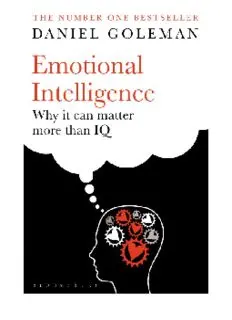
Emotional Intelligence PDF
Preview Emotional Intelligence
EMOTIONAL INTELLIGENCE WHY IT CAN MATTER MORE THAN IQ DANIEL GOLEMAN From the Library of Unviolent Revolution UnviolentPeacemaker at ThePirateBay 3/661 BLOOMSBURY For Tara, wellspring of emotional wisdom Contents Aristotle's Challenge PART ONE THE EMOTIONAL BRAIN 1. What Are Emotions For? 2. Anatomy of an Emotional Hijacking PART TWO THE NATURE OF EMOTIONAL INTELLIGENCE 3. When Smart Is Dumb 4. Know Thyself 5. Passion's Slaves 6. The Master Aptitude 7. The Roots of Empathy 8. The Social Arts PART THREE EMOTIONAL INTELLIGENCE APPLIED 9. Intimate Enemies 10. Managing with Heart 11. Mind and Medicine PART FOUR 6/661 WINDOWS OF OPPORTUNITY 12. The Family Crucible 13. Trauma and Emotional Relearning 14. Temperament Is Not Destiny PART FIVE EMOTIONAL LITERACY 15. The Cost of Emotional Illiteracy 16. Schooling the Emotions Appendix A: What Is Emotion? Appendix B: Hallmarks of the Emotional Mind Appendix C: The Neural Circuitry of Fear Appendix D: W. T Grant Consortium: Active In- gredients of Prevention Programs Appendix E: The Self Science Curriculum Appendix F: Social and Emotional Learning: Results Notes Acknowledgments Aristotle's Challenge Anyone can become angry —that is easy. But to be angry with the right person, to the right de- gree, at the right time, for the right purpose, and in the right way—this is not easy. ARISTOTLE,The Nicomachean Ethics It was an unbearably steamy August afternoon in New YorkCity,thekindofsweatydaythatmakespeoplesul- len with discomfort. I was heading back to a hotel, and as I stepped onto a bus up Madison Avenue I was startled by the driver, a middle-aged black man with an enthusiastic smile, who welcomed me with a friendly, "Hi! How you doing?" as I got on, a greeting he proffered to everyone else who entered as the bus wormedthroughthethickmidtowntraffic.Eachpassen- ger was as startled as I, and, locked into the morose mood of the day, few returned his greeting. Butasthebuscrawleduptownthroughthegridlock,a slow, rather magical transformation occurred. The drivergavearunningmonologueforourbenefit,alively commentary on the passing scene around us: there was a terrific sale at that store, a wonderful exhibit at this museum, did you hear about the new movie that just opened at that cinema down the block? His delight in 8/661 the rich possibilities the city offered was infectious. By thetimepeoplegotoffthebus,eachinturnhadshaken offthesullen shelltheyhadentered with, and when the driver shouted out a "So long, have a great day!" each gave a smiling response. Thememoryofthatencounterhasstayedwithmefor closetotwentyyears.WhenIrodethatMadisonAvenue bus, I had just finished my own doctorate in psycho- logy—but there was scant attention paid in the psycho- logy of the day to just how such a transformation could happen. Psychological science knew little or nothing of the mechanics of emotion. And yet, imagining the spreading virus of good feeling that must have rippled through the city, starting from passengers on his bus, I saw that this bus driver was an urban peacemaker of sorts,wizardlikeinhispowertotransmutethesullenir- ritability that seethed in his passengers, to soften and open their hearts a bit. In stark contrast, some items from this week's paper: •Atalocalschool,anine-year-oldgoesonarampage, pouring paint over school desks, computers, and print- ers, and vandalizing a car in the school parking lot. The reason:somethird-gradeclassmatescalledhima"baby" and he wanted to impress them. • Eight youngsters are wounded when an inadvertent bump in a crowd of teenagers milling outside a 9/661 Manhattan rap club leads to a shoving match, which ends when one of those affronted starts shooting a .38 caliber automatic handgun into the crowd. The report notes that such shootings over seemingly minor slights, which are perceived as acts of disrespect, have become increasingly common around the country in recent years. • For murder victims under twelve, says a report, 57 percent of the murderers are their parents or steppar- ents. Inalmost halfthecases, theparents saytheywere "merelytryingtodisciplinethechild."Thefatalbeatings were prompted by "infractions" such as the child block- ing the TV, crying, or soiling diapers. • A German youth is on trial for murdering five Turk- ishwomenandgirlsinafirehesetwhiletheyslept.Part of a neo-Nazi group, he tells of failing to hold jobs, of drinking, of blaming his hard luck on foreigners. In a barely audible voice, hepleads, "I can't stop being sorry for what we've done, and I am infinitely ashamed." Each day's news comes to us rife with such reports of the disintegration of civility and safety, an onslaught of mean-spirited impulse running amok. But the news simply reflects back to us on a larger scale a creeping senseofemotionsoutofcontrolinourownlivesandin those of the people around us. No one is insulated from 10/661 thiserratictideofoutburstandregret;itreachesintoall of our lives in one way or another. The last decade has seen a steady drumroll of reports likethese,portrayinganuptickinemotionalineptitude, desperation, and recklessness in our families, our com- munities, and our collective lives. These years have chronicled surging rage and despair, whether in the quiet loneliness of latchkey kids left with a TV for a babysitter, or in the pain of children abandoned, neg- lected,orabused,orintheuglyintimacyofmaritalviol- ence. A spreading emotional malaise can be read in numbers showing a jump in depression around the world, and in the reminders of a surging tide of aggres- sion—teens with guns in schools, freeway mishaps end- ing in shootings, disgruntled ex-employees massacring former fellow workers. Emotional abuse, drive-by shooting, and post-traumatic stress all entered the common lexicon over the last decade, as the slogan of the hour shifted from the cheery "Have a nice day" to the testiness of "Make my day." Thisbookisaguidetomakingsenseofthesenseless- ness. As a psychologist, and for the last decade as a journalistforTheNewYorkTimes,Ihavebeentracking theprogressofourscientificunderstandingoftherealm of the irrational. From that perch I have been struck by twoopposingtrends,oneportrayingagrowingcalamity
